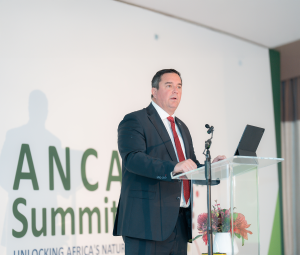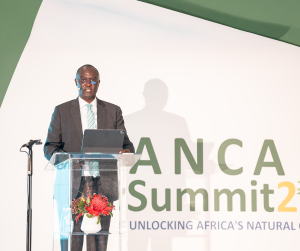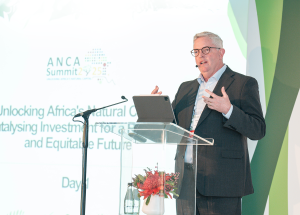
The African Natural Capital Alliance (ANCA) Summit that recently concluded in Cape Town represented a watershed moment for the continent—an ambitious and action-oriented gathering of leaders, innovators, and changemakers committed to fostering solution-oriented dialogue and driving the transition towards nature-positive economies across Africa. This second edition of the ANCA Summit, hosted at the iconic Mount Nelson Hotel from October 7-9, brought together policymakers, financiers, entrepreneurs, and conservation pioneers under one compelling vision: Unlocking Africa’s Natural Capital: Catalysing Investment for a Resilient and Equitable Future.
A Historic Venue for a Historic Moment
There was profound symbolism in choosing the Mount Nelson Hotel as the summit venue. Opened in 1899 with a bold vision to rival the most elegant hotels anywhere in the world, the Mount Nelson survived wars, witnessed pivotal historical moments, was repainted pink in 1918 to celebrate peace after the Great War, and has for more than a century served as a meeting place for world leaders and changemakers. This same spirit of audacity and transformative purpose animated the ANCA Summit. ANCA believes that African-led nature finance can transform the continent’s relationship with its natural wealth. Thanks to our sponsors, an opportunity to gather atMount Nelson’s acres of elegant gardens, in the shadow of Table Mountain, set the stage for reimagining Africa’s bioeconomy. This was a summit hosted in a space that itself embodies the conviction that Africa can be the home of world-class institutions.

The mood was unmistakably one of conviction and momentum. Against the backdrop of South Africa’s historic G20 Presidency, the summit served as a dynamic platform for collaboration, innovation, and strategic action, enhancing cross-sector and public-private partnerships, mobilising capital for nature-positive investments, and building momentum around advancing finance for a thriving African bioeconomy. As South Africa’s Agriculture Minister John Steenhuisen declared in his keynote address,
“The bioeconomy offers a truly transformative pathway to address the triple planetary crisis: climate change, biodiversity loss, and pollution. The bioeconomy is the core solution.”
His words captured the palpable energy permeating the summit and was a recognition that Africa stands at an inflection point where strategic investment in its biological resources could rewrite the continent’s economic trajectory.
A Continent Rich in Potential, Yet Underutilised
The numbers paint a stark picture of both opportunity and urgency. Africa currently captures less than 10% of the value from its biomass, a disparity that Minister Steenhuisen rightly termed “a remarkable opportunity.” The continent controls 20% of the world’s landmass, hosts one-sixth of global plant species, is home to 25% of mammal species and 20% of bird species, and holds 20% of global mangroves and 8% of global peatlands. Yet this extraordinary ecological wealth remains largely underdeveloped, with Africa losing approximately $195 billion annually through land degradation, deforestation, and unsustainable agriculture.
The summit’s opening sessions made clear that this trajectory is neither inevitable nor acceptable. The urgency stems not merely from economic self-interest but from existential necessity. With warming on track to reach 3.1 degrees Celsius this century, Africa faces disproportionate climate impacts that threaten to undermine even the most promising development initiatives before they reach scale. Yet within this urgency lies hope, with the bioeconomy represents a pathway to climate mitigation and adaptation simultaneously.
Day 1: Catalysing Strategic Public-Private Nature Finance Collaboration

The summit’s opening day set the tone for the entire gathering through carefully curated conversations that brought together the continent’s leading voices on nature finance. Dorothy Maseke, Head of the ANCA Secretariat, opened the proceedings with a vision address, followed by Arthur Oginga, CEO of Old Mutual Holdings East Africa and newly appointed member of the inaugural ANCA Governing Council, who spoke on behalf of the ANCA Council. He underscored the private sector’s growing recognition that nature is not merely an environmental concern but a fundamental economic imperative. In his remarks, Oginga articulated a vision that would echo throughout the summit:
“By aligning capital flows with nature-positive outcomes, we can help restore ecosystems, strengthen climate resilience, and unlock sustainable livelihoods for millions across the continent.”
The formal announcement of the inaugural ANCA Governing Council marked a pivotal moment of institutional consolidation. Alongside Oginga, the Council brings together Africa’s most influential leaders in finance, policy, and conservation, including Jason Quinn (CEO, Nedbank), Eliane Ubalijoro (CEO, CIFOR-ICRAF), Dr David Obura (Chairman, Intergovernmental Science-Policy Platform on Biodiversity and Ecosystem Services—IPBES), and Kaddu Sebunya (CEO, African Wildlife Foundation). This constellation of leadership—with collective assets and influence spanning the continent—signals the significance of ANCA: the alliance now counts 130 members with combined assets exceeding £1 trillion, positioning it as a genuine powerhouse capable of catalysing continental transformation.

The morning keynotes, delivered by Khorommbi Matibe, Chief Director of South Africa’s Department of Forestry, Fisheries & Environment, and Scyrielle Sende, CEO and Director General of Gabonese Agency for the Development of the Green Economy AGADEV , positioned nature finance within the urgent context of Africa’s G20 presidency and the continent’s extraordinary natural resource endowments. These opening remarks set the stage for the Financial Sector Perspective and Pipeline Generation session, where the newly appointed Council members articulated how financial institutions are beginning to recognise and mobilise capital for nature-positive investments. Jason Quinn’s presence in particular underscored Netbank’s transformation into one of the continent’s leading advocates for embedding natural capital into financial decision-making.

The morning also featured critical conversations on nature disclosures and policy integration, where leaders including Candice Dott (TNFD), Innocent Onah (African Development Bank), Chesney Huskisson (Landbanking Group), Justin Smith (Sustainable Finance Coalition), and Fiachra Kearney (Forever Wild) explored how to embed natural capital accounting into national policy frameworks and corporate balance sheets. These discussions revealed a sophisticated understanding among policymakers and investors that the future of Africa’s development hinges on properly valuing and accounting for nature—not as a constraint on economic activity but as its fundamental prerequisite and greatest asset.
Bridging Policy, Finance, and Innovation
Day 2 of the summit focused on “Scaling Finance for a Thriving African Bioeconomy,” and the conversations that unfolded revealed sophisticated thinking about how to overcome the systemic barriers impeding investment. Minister Steenhuisen outlined a vision of bioeconomy finance that transcends traditional grants and moves toward “serious institutional investment” that can reach the scale required for transformation.
Dr. Sue Snyman, Research Director at the African Leadership University’s School of Wildlife Conservation, brought a crucial reminder to the conversation:
“If people don’t see tangible gains, they will have no incentive to protect ecosystems.”

Her words reframed the entire investment agenda around equity and community benefit, arguing that success hinges on keeping communities at the centre of initiatives and abandoning the false choice between conservation and development. This sentiment echoed throughout the summit’s discussions on public-private partnerships, where successful models combined government commitments, private investment, philanthropic capital, and operational revenue, attracting larger investments and reducing individual investor risk.

Simone Smith, Director of Africa at The Earthshot Prize, brought her own expertise in identifying climate entrepreneurship and ecosystem partnership-building, underscoring the Prize’s commitment to spotlighting African-led innovation. These were not abstract conversations, they were grounded in the reality that emerging market-based tools, from biodiversity credits to conservation bonds, are beginning to unlock capital flows toward nature-positive outcomes.
From Vision to Venture: The PPP & Bioeconomy Hackathons
Perhaps the most tangible expressions of the summit’s ambition emerged during two intensive hackathon sessions, each designed to translate compelling problems into investment-ready business models. The Public-Private Partnership Hackathon brought together cross-sector teams in a frenetic design sprint format, with the audacious objective of generating actionable PPP models capable of securing funding within 12 months. Participants engaged in challenge categories spanning conservation finance mechanisms, wildlife economy partnerships, urban nature solutions, technology-enabled conservation, and community-centered models, working under the guidance of experienced judges and coaches from leading financial institutions. As one facilitator noted, the session aimed to “bring investors and project developers closer together, both in terms of their requirements of one another and in terms of the language that they use to talk about these opportunities.”

The Public-Private Partnership Case Study Showcase complemented the hackathon energy with hard-won evidence from the field. Four transformative partnership models demonstrated how innovative collaboration is already unlocking Africa’s natural capital while delivering measurable returns. These ranged from biotechnology commercialisation in agriculture linking research institutions with private sector companies, to conservation management spanning 20 million hectares across 12 countries, marine conservation financing innovations, and climate infrastructure investments mobilising local currency and domestic capital. The showcase underscored a critical truth: successful PPPs combine multiple funding sources, prioritise community benefit-sharing, employ long-term partnership agreements that provide stability for transformative outcomes, and harness Africa’s vast domestic capital pools that have remained underutilised.

The Bioeconomy Hackathon meanwhile focused on nature-based solutions across agri-tech, marine blue economy, forest-based systems, waste-to-value, and health biotechnology themes with each category teeming with business model innovations that teams rapidly refined and pitched to investor panels. What made both hackathons extraordinary was not merely the breadth of ideas but the commitment of investors and development finance institution representatives to move winning concepts forward, ensuring teams departed with clear feedback, guidance, and learning.

The Africa Bioeconomy Finance Hub: A Catalytic Game-Changer
Anchoring the entire summit was the formal announcement of the Africa Bioeconomy Finance Hub, a transformative initiative designed to be the connective tissue binding policy enablement, capacity building, investment acceleration, and impact measurement into a coherent ecosystem. Headquartered in Africa and an initiative supported by the G20 Initiative on the Bioeconomy under South Africa’s G20 presidency, the Hub represents an intentional shift away from donor-driven models toward African-led, self-sustaining nature finance.
The Hub’s ambitions are breathtaking: by 2035, it aims to mobilise over $50 billion in private and public bioeconomy investments across Africa, enable 10 million farmers to benefit from bioeconomy innovations, achieve a 30% reduction in agricultural waste through circular models, and capture 50% of the final value from Africa’s biomass—up from today’s mere 10%. These are not aspirational; they are carefully calibrated targets grounded in the investment structures and partnership architectures now being activated.
The Call to Capital

As the Summit concluded, the message to investors, project developers, and development partners was crystalline: Africa is not seeking charity or sympathy. It is calling for partnership rooted in mutual benefit and shared vision. The continent’s natural capital represents one of humanity’s most valuable and underutilised assets. The bioeconomy is not a sideshow to Africa’s development trajectory, it is the main event.
Arthur Oginga’s words, reflecting the conviction of ANCA’s new Governing Council, captured this succinctly:
“I am honoured to join the ANCA Governing Council at such a pivotal time for Africa.”
This is not mere rhetoric. It represents a fundamental shift in how Africa’s financial leadership views the continent’s future. Minister Steenhuisen’s related observation that financing the bioeconomy at scale is about “turning environmental care into tangible economic benefits for every producer” and “elevating agriculture from a high-risk, commodity-driven sector to a globally competitive, resilient, and value-adding powerhouse, “speaks to the opportunity that the ANCA Summit has crystallised.
The Africa Bioeconomy Finance Hub represents institutional architecture designed to ensure that capital flows from both within and outside the continent toward nature-positive solutions led, owned, and scaled by Africans themselves. They embody a philosophical conviction that nature finance is not about pricing nature but valuing nature-positive outcomes and ensuring that those delivering those outcomes are rightfully compensated.
The summit showcased business models, case studies, and investment opportunities that align financial returns with nature-positive outcomes, demonstrating that the path to a resilient and equitable future runs directly through strategic investment in Africa’s natural capital. This alignment of economic, environmental, and social imperatives is not theoretical but is already manifesting in projects across the continent that are proving nature-positive investments can deliver competitive returns while restoring ecosystems and empowering communities.
Looking Ahead: The Momentum Continues

The summit has concluded, but the work accelerates. Across the continent, financial institutions are beginning to incorporate bioeconomy metrics and standards into their investment frameworks. Policymakers are translating national bioeconomy strategies into finance-ready roadmaps. This is not the beginning of Africa’s bioeconomy transition—that work has been underway for years through the quiet dedication of scientists, entrepreneurs, farmers, and conservationists across the continent. But the ANCA Summit has done something remarkable: it has elevated that work into mainstream finance, brought it into the orbit of central banks and multilateral development banks, and positioned it as the strategic imperative for African prosperity and planetary resilience.
The summit has also signalled that the next gathering will build on this momentum. As plans take shape for the third edition of the ANCA Summit,, the continent can look forward to reporting on the capital mobilised, the projects scaled, the farmers empowered, and the ecosystems restored. The real measure of this summit’s success will be written not in the speeches or panel discussions, but in the lives transformed, the forests protected, the soils regenerated, and the wealth created for African communities stewarding their natural heritage.
Africa’s bioeconomy is no longer a future possibility. It is now a present imperative with institutional backing, investment capital, and the conviction of a continent determined to write its own development story. Stay tuned for news about upcoming convening where we continue to gather to celebrate progress, share learnings, and accelerate the transition toward a nature-positive African future.
Credit:
This blog was written by Josh Ayers, FRGS, Senior Research Impact Fellow.
The Nature & Climate Impact Team at the University of Exeter are Knowledge Partners to ANCA.

